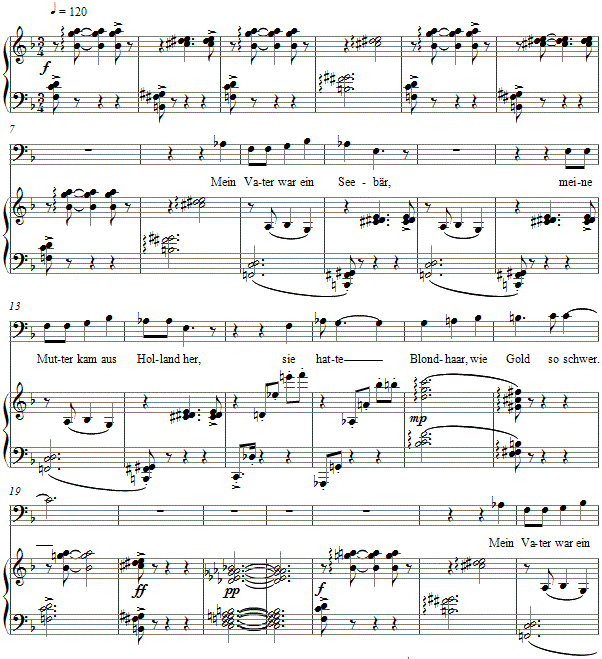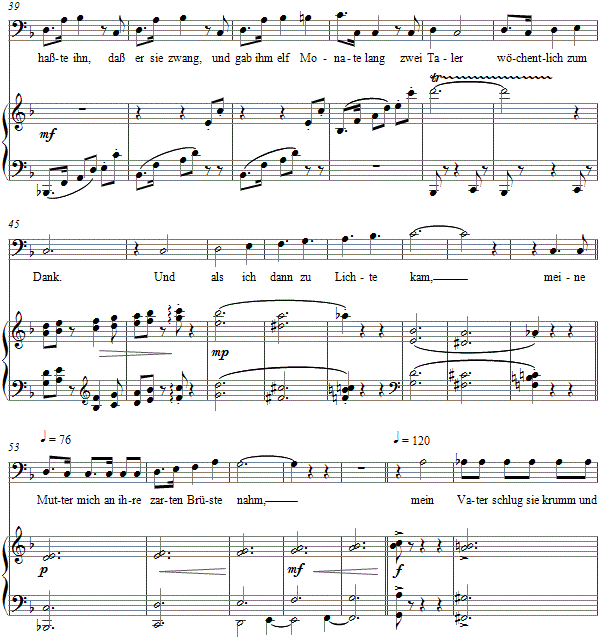Music and Texts of GARY BACHLUND
Vocal Music | Piano | Organ | Chamber Music | Orchestral | Articles and Commentary | Poems and Stories | Miscellany | FAQs
Ballade für Frank Wedekind - (2011)
Klabund
for baritone and piano
Mein Vater war ein Seebär,
Meine Mutter kam aus Holland her,
Sie hatte Blondhaar, wie Gold so schwer.
Mein Vater war ein grobes Schwein,
Meine Mutter war zart und klein,
Sie war zu schwach, sie sagte nicht nein.
Sie haßte ihn, daß er sie zwang,
Und gab ihm elf Monate lang
Zwei Taler wöchentlich zum Dank.
Und als ich dann zu Lichte kam,
Meine Mutter mich an ihre zarten Brüste nahm,
Mein Vater schlug sie krumm und lahm.
Ersäufen wollte er mich im Fleet,
Meiner Mutter Flehen war Gebet.
Er hat sich fluchend umgedreht.
Da lief sie in die Nacht hinaus,
Setzte in dunkler Twiete mich aus,
Ging in die Ulrikusgasse ins Freudenhaus.
Mich fand ein Irgendwer,
Wenn ich wüßte, wo meine Mutter wär,
Wär mir nicht oft das Herz so schwer.
In der Ulrikusgasse Nummer fünf spiel ich Klavier.
Vielleicht tanzt meine Mutter hinter mir,
Vielleicht schläft sie des Nachts bei mir...[ 5 pages, circa 3' 40" ]
Klabund
Ballad for Frank Wedekind
My father was a fur seal,
My mother came from Holland,
She had blonde hair, heavy as gold.
My father was an enormous pig,
My mother was sweet and kind,
But being weak, she did not refuse him.
She hated him, for he enforced
For eleven long months
Two Talers a week as "thanks."
And when I came along,
My mother took me to her sweet breast,
My father beat her bent and lame.
He almost drowned me in the sea,
My mother's pleas were a prayer.
He turned away cursing.
She ran out into the night,
And hid us in a darkened alley, [ 1 ]
On the way to the brothel on Ulrikus Street.
Someone found me,
If I knew where my mother was,
My heart has never been so heavy.
At Ulrikus Street Number Five I play piano,
Perhaps my mother dances behind me,
Perhaps she sleeps with me at night.
gb
Klabund was among the pseudonyms which German author Alfred Henschke (1890-1928) used through his short life. His published works include 25 plays, 14 novels, historical works, poems and numerous articles. His satire on the dark stories of Frank Wedekind is amusing, for Wedekind as Klabund's contemporary created a literary scandal with his exploration of sexuality of all sorts framed in the darkest theme of violence, from rape to murder. Such are Wedekind's Frühlings Erwachen and the Lulu plays, on which Berg's opera is based. In Klabund's telling, he sets the stage in perhaps Hamburg, a harbor city where one finds an Ulrikusstrasse, interestingly the subject of Max Beckman's 1912 images of woman outside a bordello in Ulrikusstrasse in Hamburg, but also the street on which the parents of Johannes Brahms lived for a time and one which, additionally, Frau Brahms sold Dutch goods. Strange connections with imagery, history and literature, to be sure.
As the early 20th century was also enthused by the new "atonalists," which became the duodecaphonal school, I choose to break the twelve-note scale at first into two hexachords related at the interval of the tritone, as at measures one and two. Even so, the second hexachord functions well as a false dominant for the purposes of the opening gambit of this satire. The "curtain" at measure 21 is of course all twelve notes easily reached in two clusters by the right and left hands. Another gesture based on tetrachords associated by half steps is another tongue-in-cheek reference to the early 20th century flirtation with the seduction of all twelve tones.
Some subsequent strophes of the poem are accompanied in a more consonant style, the trill on the high D reminiscent of so many composers employing such a simple gesture when the sound of coin might be imagined. The brutality of the father is contrasted with the tender imagery of a mother, and yet Klabund's "mother" figure is possibly in the employ of the brothel where the abandoned child works -- naturally as a musician -- and perhaps even has had sexual relations with him. Such is the world of Wedekind which Klabund parodies.
The score for Ballade für Frank Wedekind is available as a free PDF download, though any major commercial performance or recording of the work is prohibited without prior arrangement with the composer. Click on the graphic below for this piano-vocal score.
NOTES
[ 1 ] The unusual German, Twiete, appears in a number of texts, among them Theodor Storm, and refers to that sort of back alley which in rainy weather usually floods, making foot traffic impossible, and sometimes necessitating crossing through one building to another by other improvised means.
Klabund intends his reader to imagine a depressed neighbor of brothels and the poor, far from the better neighborhoods. This is another color in his storytelling as a parody of Wedekind in this "ballad."
An early work of Klabund from 1925 was adapted by Berthold Brecht in his The Caucasian Chalk Circle, such that we see Klabund now as an influence on the early 20th century German scene. Two settings of short Wedekind texts may be found by clicking here.


